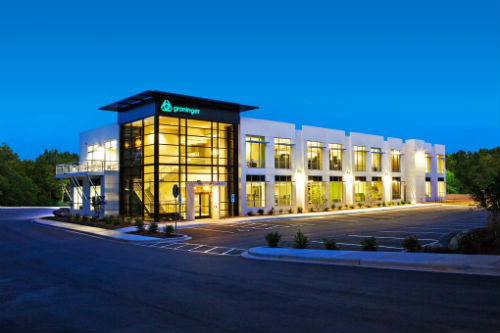
Charlotte-based groninger USA Growing NC’s Fill-and-Finish Sector

When you get an injection, apply eye drops, swallow cough syrup or apply mascara, there’s a good chance that the product may have been packaged by a machine made by groninger, a German company with a growing U.S. headquarters in Charlotte.
groninger makes and services high-precision machines for filling, closing, sealing and handling a wide variety of products sold by the pharmaceutical, consumer health care and cosmetics industries worldwide. Since its founding in 1980, the company has installed more than 8,500 custom-designed processing machines at companies on all seven continents.
One of those machines, an award-winner called INTEGRA, was on display this month when groninger USA hosted a meeting of the Advisory Committee for Biotechnology in Greater Charlotte. The committee, sponsored by the North Carolina Biotechnology Center, is a group of life science leaders from industry and academia who recommend ways to grow the life science sector in the 11-county greater Charlotte region.
“The Biotech Center recognizes groninger as an outstanding example of an innovative company with a culture dedicated to improving lives,” said Corie Curtis, executive director of the Biotech Center’s Greater Charlotte Office. “groninger's technological prowess is evident with its new INTEGRA line.”

INTEGRA has made waves in the packaging industry since its introduction in 2018. It won an innovation award for filling and packaging last year at the ACHEMA trade show in Frankfurt.
The machine was developed jointly by groninger and SKAN, a Swiss pioneer in cleanroom equipment and isolator design for the global pharmaceutical industry. SKAN’s U.S. headquarters is not far away, in Raleigh -- a significant realization of North Carolina's relentless push for partnerships and global leadership for the state's transformation into global life science leadership. It's especially evident in pharmaceutical and biomanufacturing, in every aspect from fill-and-finish production to cell therapy biomanufacturing.
The INTEGRA integrates both an isolator and a filling machine for bulk vial processing. groninger notes that the INTEGRA's built-in isolator makes it ideal for safely filling a full range of therapeutics, including potent, live-virus or hormone products.
Isolators provide a barrier between the machine operator and the product during filling and finishing operations, protecting operators from infectious agents and maintaining aseptic and sterile conditions so products aren’t contaminated by microbes.
Depending on customer need, INTEGRA can also be supplied with a laminar-flow/ORABS (open restricted access barrier system) instead of the isolator.
groninger’s INTEGRA "is a remarkable advancement from early isolator technologies," says advisory committee member and pharmaceutical industry veteran Terry Novak, the Charlotte-based chief operating officer of Tedor Pharma, a Rhode Island-based contract development and manufacturing operation.
Another groninger machine, a modular aseptic fill/finish machine called the FlexPro 50, also won recognition last year at the International Pharmaceutical Expo (INTERPHEX) in New York. The machine can be changed to process different biotech products in two hours.
A global company drawn to Charlotte
groninger, a family-owned company based in Crailsheim, Germany, was founded by Horst Groninger, whose invention of the rotary piston pump allowed manufacturers to process chemical, cosmetic and pharmaceutical preparations more precisely and more hygienically.
Since then the company has grown to more than 1,200 employees worldwide, including 57 in Charlotte. groninger reported revenue of 170 million euros in 2017 (approximately $157 million), up from 156 million euros in the previous year.
The company established U.S. operations in Basking Ridge, N.J., in 1997 but relocated them to Charlotte in 2007.
The company was drawn to North Carolina by a strong presence of other German companies in the greater Charlotte region, proximity to its international airport with nonstop flights to Frankfurt and Munich, the state’s reputation for advanced manufacturing, and the high quality of life enjoyed by its German employees moving to the U.S., says Andrea Guzman, marketing coordinator for groninger USA.
“It was a plus that we have good golf courses around here,” says Guzman, noting that the company’s owners enjoy time on the links.
groninger USA has been a vital part of the region’s growing life science sector, Curtis notes. “The Charlotte Region has a diverse life science community with 60 life science companies and 350-plus additional asset companies, which serve a variety of critical support needs,” she says.
The groninger facility was opened in 2012 at 14045 South Lakes Drive, near the Charlotte Douglas International Airport.
“We are very blessed with our state-of-the-art 25,000 square-foot facility in Charlotte,” says Heiner Dornburg, chief executive officer of groninger USA. “Our North American customers greatly benefit from the complete range of capabilities available locally. From parts and software engineering to advanced CNC (computer numerical controlled) machining and assembly, and from spare part storage to remote and on-site service, we satisfy our machine users’ entire range of needs.”
The use of CNC machines offers an automated way of machining parts to precise specifications. CNC machining enables reduced lead times for replacement parts.The Charlotte facility is hiring more field service technicians and sales representatives, Dornburg says. Also, the company’s four-year apprenticeship program for field service technicians will graduate several apprentices next year.
The company’s core competency is the design and manufacture of customized, aseptic and non-aseptic liquid fill/finish lines. Machines range from small R&D equipment to high-speed commercial production lines including washing, sterilizing, filling, closing, labeling and inspecting. Some machines reach speeds up to 1,000 objects per minute.
For the pharmaceutical industry, groninger’s machines can process cartridges, eye drops, nasal sprays and vials and syringes in bulk as well as pre-sterilized in nested tubs. For consumer healthcare, they process sprays and drops, syrups, medical care and hygiene products, diagnostics and dietary supplements. And for the growing cosmetics sector, the machines process creams and makeup, perfumes and fragrances, body and hair-care products, mascara, lip gloss, eye liner and nail polish.
groninger will hold its first “Service Days” on May 1 and 2 in Charlotte. The event will
